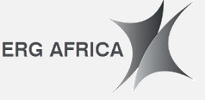Metalkol RTR is set to become one of the world's leading cobalt producers and one of the largest suppliers of cobalt to China. The aim is to produce enough cobalt to power more than three million EVs per year.
Metalkol RTR A major tailings reprocessing operation
Metalkol Roan Tailings Reclamation (RTR) in the Kolwezi area of the DRC consists of two legacy tailings deposits hosting approximately 110 million tonnes of reserves (2019). In 2020, Metalkol reached full Phase 1 production capacity and completed Phase 2 construction, with the additional plant increasing its production. In 2021, Metalkol achieved its design capacity for cobalt production and exceeded budget production for both its products, producing 20 718 tonnes of cobalt and 94 807 tonnes of copper.
Unlike conventional mining operations which extract primary ore, at Metalkol RTR legacy copper-cobalt tailings are reclaimed and reprocessed. Since the 1950s previous operators have been releasing these tailings into the environment (including the Musonoi River). Over decades this waste material has accumulated into one of the largest tailings deposits in the world and continues to cause water and dust pollution, negatively impacting local aquatic systems, ecological habitats and surrounding communities. This presents a unique opportunity for us to go beyond ‘do no harm’ and to progressively address the extensive legacy of environmental degradation and pollution while improving the quality of life of local communities.

20km from Kolwezi
Working at Metalkol RTR
Our human resources policy prioritises local recruitment and talent sourcing as well as capacity building, knowledge transfer and succession planning. We strive to not only be a safe workplace, but also one where all colleagues can develop and reach their full potential. As such, we are fully committed to the principle of equal opportunity and maintaining a fair and non-discriminatory work environment. We treat our employees fairly, equally and without prejudice, irrespective of gender, race, age, disability or sexual orientation.
As of 30 June 2021, Metalkol RTR had 2,452 workers involved in the project, operations and further ramp up activities – 2,311 of whom are Congolese nationals. As we continue to expand our full time operational workforce to support the project’s transition from construction to production, short-term contractors are hired as and when required, in response to specific onsite needs (such as administration, maintenance etc.) In 2020, this involved more than 500 people from communities surrounding Metalkol RTR.
Remuneration and Benefits
As an open and transparent company, committed to in-country regulatory frameworks, our approach to labour relations is underpinned by constructive engagement with our employees’ unions. Metalkol RTR fully respects the right of all employees to join unions and to freely engage in collective bargaining. Meetings between management and union representatives are held quarterly and when necessary to cover any urgent matters.
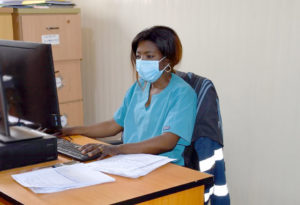 Metalkol RTR provides competitive remuneration aligned with union agreements and legislative requirements. In addition, permanent Congolese employees receive school fees, housing, transport and family allowance as well as other welfare benefits. Recently, we engaged with union representatives to review the framework for employee benefits. This process was completed in January 2021, and resulted in an agreement to increase annual leave and to provide medical care for the parents of employees.
Metalkol RTR provides competitive remuneration aligned with union agreements and legislative requirements. In addition, permanent Congolese employees receive school fees, housing, transport and family allowance as well as other welfare benefits. Recently, we engaged with union representatives to review the framework for employee benefits. This process was completed in January 2021, and resulted in an agreement to increase annual leave and to provide medical care for the parents of employees.
Training and Development
We continue to deliver technical skills assessments for our new and existing employees, and are also rolling out targeted training programmes, focused on competency and leadership, to fill identified skills gaps. We have recently launched a new apprenticeship scheme covering technical skills relevant to the industry.
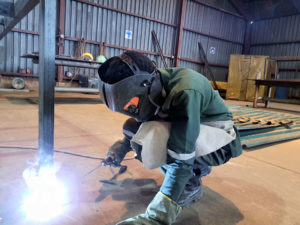 In 2021, Metalkol RTR welcomed its first two apprentices, Joel Ilunga Mwanza and Kasak Kabwik, who acquired industrial welding skills through hands-on training in Metalkol RTR’s workshop over a period of three months. The development programme has since been expanded to include an additional six apprentices, including four women.
In 2021, Metalkol RTR welcomed its first two apprentices, Joel Ilunga Mwanza and Kasak Kabwik, who acquired industrial welding skills through hands-on training in Metalkol RTR’s workshop over a period of three months. The development programme has since been expanded to include an additional six apprentices, including four women.
After completing the training, apprentices receive accreditation from the Congolese Government’s Institution for Vocational and Professional training (Institut National De Preparation Professionnelle (INPP)). Their names are also kept in the Metalkol RTR database for future job opportunities.
Safety and PPE
As set out in both ERG’s Code of Conduct and Metalkol RTR’s Human Rights Statement of Commitment, we are fully committed to ensuring the security, health and safety of all those working on the Metalkol RTR site.
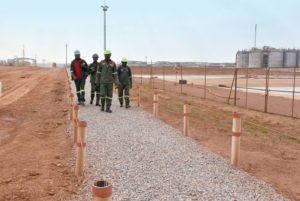 Our Safety, Health and Sustainability (SHS) management system oversees OHS risks in line with ERG and Metalkol RTR’s OHS policy. Suppliers are also required to adhere to Metalkol RTR’s policies and procedures or have their own at a similar standard. Any breaches are immediately investigated and addressed.
Our Safety, Health and Sustainability (SHS) management system oversees OHS risks in line with ERG and Metalkol RTR’s OHS policy. Suppliers are also required to adhere to Metalkol RTR’s policies and procedures or have their own at a similar standard. Any breaches are immediately investigated and addressed.
Internal safety and hygiene audits are regularly carried out to assess safety risks and adherence to OHS procedures. This is supported by Our Visible Felt Leadership safety programme, which includes the undertaking of regular site visits by senior operation-level managers and the hosting of cross-departmental meetings to share safety best practices.
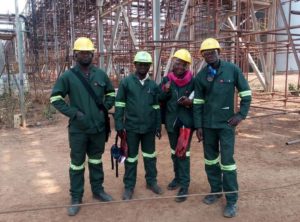 Our industrial hygiene programme also protects employees’ health at work, monitors and maintains regulatory compliance and manages key health risks. This includes the provision of employee awareness training around dust, noise and acid mist exposure as well as monitoring and analysis programmes. Water spraying is also undertaken to suppress dust at the site, combined with enhanced personal protective equipment (PPE) and biannual medical examinations for our employees.
Our industrial hygiene programme also protects employees’ health at work, monitors and maintains regulatory compliance and manages key health risks. This includes the provision of employee awareness training around dust, noise and acid mist exposure as well as monitoring and analysis programmes. Water spraying is also undertaken to suppress dust at the site, combined with enhanced personal protective equipment (PPE) and biannual medical examinations for our employees.
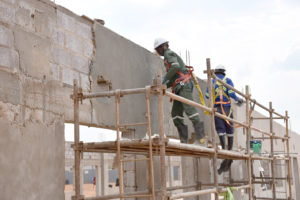 All employees, contractors and visitors to site are required to participate in safety training. It is also compulsory for all workers onsite (direct and contract employees) to adhere to the Metalkol RTR standards for PPE. The PPE provided by Metalkol RTR conforms to international standards (SANS, EN, NFPA and ANIS) and is available to all employees and labour hire workers. Contractors are required to provide PPE meeting these outlined standards to their employees.
All employees, contractors and visitors to site are required to participate in safety training. It is also compulsory for all workers onsite (direct and contract employees) to adhere to the Metalkol RTR standards for PPE. The PPE provided by Metalkol RTR conforms to international standards (SANS, EN, NFPA and ANIS) and is available to all employees and labour hire workers. Contractors are required to provide PPE meeting these outlined standards to their employees.
Personal Health
The health and wellbeing of all employees is addressed through a number of company initiatives. These include malaria prevention measures, such as spraying and fumigation, and providing antenatal healthcare. We regularly engage with local government health departments, with a view to assist in raising awareness about HIV/AIDS as well as prevention and treatment.
 As part of ongoing medical benefits, we have agreements with two clinics in Kolwezi and Lubumbashi, to provide enhanced medical care to our employees and their families. These clinics provide a wide range of services, including emergency and pediatric treatment, minor and major surgery, antenatal services, x-rays, laboratory testing and a pharmacy. For immediate needs, a clinic is available onsite for employees and contractors.
As part of ongoing medical benefits, we have agreements with two clinics in Kolwezi and Lubumbashi, to provide enhanced medical care to our employees and their families. These clinics provide a wide range of services, including emergency and pediatric treatment, minor and major surgery, antenatal services, x-rays, laboratory testing and a pharmacy. For immediate needs, a clinic is available onsite for employees and contractors.
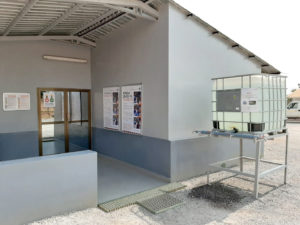 With the continuation of the pandemic, every effort is taken to ensure the mass cleaning of working and living areas, social distancing, the procurement of additional PPE and the use of thermal scanners and education campaigns. Additionally, we protect ‘at-risk’ employees by shifting them from higher-exposure activities to remote working or safer shift patterns, where possible. We are also participating in government vaccination campaigns, in conjunction with internal activities encouraging employees to get vaccinated, as well as supporting the families of employees with protective masks.
With the continuation of the pandemic, every effort is taken to ensure the mass cleaning of working and living areas, social distancing, the procurement of additional PPE and the use of thermal scanners and education campaigns. Additionally, we protect ‘at-risk’ employees by shifting them from higher-exposure activities to remote working or safer shift patterns, where possible. We are also participating in government vaccination campaigns, in conjunction with internal activities encouraging employees to get vaccinated, as well as supporting the families of employees with protective masks.
Grievances and Protection from Discrimination and Harassment
The Code of Conduct, compliance policies and procedures and Hotline are in place, and training on these is provided annually and as part of induction processes. Details are communicated widely, in French, English and Swahili, using posters and other communication channels. Metalkol RTR’s procedures apply to employees and contractors, and cover bullying, sexual harassment and other forms of discrimination.
Any concerns, which can be raised anonymously, are investigated, whether raised by or relating to an employee or a contract employee. In the case of a contract employee, disciplinary action includes the removal of the employee from site. Metalkol RTR also utilises an employee grievance mechanism where issues/concerns can be discussed with an independent employee.
In addition, we apply a community grievance procedure, aligned with the IFC Performance Standards and UN Guiding Principles on Business and Human Rights, which supports the continuous, timely identification, review and management of our actual and potential impacts. These are publicised widely, including to local communities, and also provide a conduit for grievances that may arise from local employees or other workers.
Women at Metalkol RTR
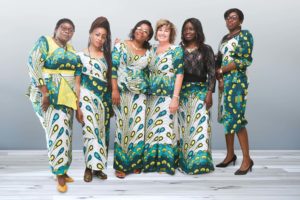 In 2021, on International Women’s Day, Metalkol RTR also established a Women’s Committee to represent the interests of its female workers on site. The committee addresses areas such as working conditions for women and women’s rights. In collaboration with Metalkol RTR’s senior management, the committee is also helping develop strategies to further promote and progress the development of women in the workplace.
In 2021, on International Women’s Day, Metalkol RTR also established a Women’s Committee to represent the interests of its female workers on site. The committee addresses areas such as working conditions for women and women’s rights. In collaboration with Metalkol RTR’s senior management, the committee is also helping develop strategies to further promote and progress the development of women in the workplace.
Onsite Facilities
Everyone onsite has access to mess facilities and drinking water stations, which are freely accessible and located across our operations. For employees who live onsite, as well as providing accommodation that adheres to international standards, we also offer free-to-use fitness facilities. Periodic surveys are conducted, and a specific suggestion/feedback box is available to ensure that standards are maintained.
Ethics and Governance
Our Clean Cobalt Framework, which was launched at Metalkol RTR in December 2018, has further embedded responsible business practices in what is a sensitive operating environment. The Framework supports our ongoing efforts to comply with – and go beyond – the OECD Due Diligence Guidance for Responsible Supply Chains of Minerals (‘OECD Guidance’).
In 2019, we implemented the Framework in practice and published our inaugural Clean Cobalt Performance Report, which was independently assured by PwC. This found that, as of 1 March 2019, Metalkol RTR had established and implemented systems and procedures to align with the Clean Cobalt Framework as well as the OECD Guidance. External assurance of the next Clean Cobalt Performance report has been delayed by COVID-19 restrictions, but is scheduled to be conducted in 2021.
This Framework and Performance Report addresses labour relations, including relevant labour law. Our commitment to fair labour practices is also set out in both the ERG Code of Conduct and the ERG Supplier Code of Conduct.
Labour Relations – Suppliers
Under our Human Rights Policy, we are committed to respecting universally recognised human rights and labour standards. These requirements are embedded in our Group Supplier Code of Conduct. Key stipulations under the ERG Supplier Code of Conduct include:
- Providing workers with a safe and healthy work environment, consistent with relevant ERG policies or procedures or applicable national and international standards, whichever is higher
- Not engaging in any use of forced or compulsory labour or child labour
- Complying with the ERG Human Rights Policy – as well as the UN Guiding Principles on Business and Human Rights, the OECD Due Diligence Guidance on Responsible Supply Chains of Minerals and the Voluntary Principles on Security and Human Rights.
Suppliers are selected based on their full compliance with our Human Rights Policy and Supplier Code of Conduct. This is included as part of our CPDD process at onboarding and contract renewal stage, and also forms part of supplier audits and training for key/high risk suppliers (based on our risk assessment process.)
Our contractual terms with suppliers embed our requirements in relation to labour rights, health and safety, and human rights of workers. Depending on the assessed risk profile of the supplier and the nature of services, additional requirements are included in contracts. Supplier audits include reviews of human resources files, policies and procedures and payment information.
As part of contractor management, onsite contractors are also subject to multiple types of inspections and reviews, from daily safety inspections to formal audits.
